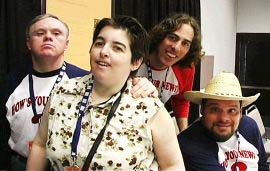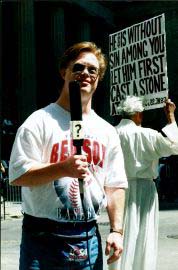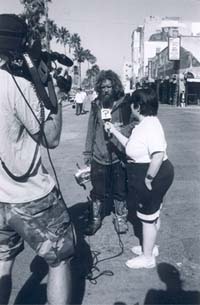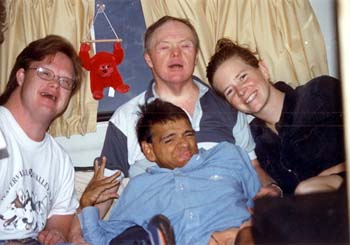|
How’s Your News?
is directed by Arthur Bradford (author of the short
story collection Dogwalker). It features five disabled
newscasters, Bobby Byrd, Sean Costello, Susan Harrington,
Larry Perry, and Ronnie Simonsen (read about each of their
bios at www.howsyournews.com/crew.html),
whom Arthur met while working at Camp Jabberwocky, a summer
camp for disabled adults. This unlikely group sets off
on a cross-country adventure from Massachusetts to Los
Angeles. Along the way, they stop in such places as a
Nashville honky-tonk, an alligator farm, and a Texas cattle
auction, and randomly interview those they encounter for
the television show How’s Your News?. (Originally,
How’s Your News? was going to be a pilot for Comedy
Central.)
 |
Here’s the strange thing,
How’s Your News? isn’t really a documentary. Well,
it is a documentary (it’s documenting this road trip),
but it isn’t a documentary in the traditional sense. (If
you are familiar with Arthur Bradford’s fiction, then
you’ll know that traditional isn’t an adjective that fits
his vision.) The newscasters are performing, and some
of the interviews are obviously set-up. What makes the
movie endearing (and sometimes difficult) to watch is
the interaction between the disabled interviewer and the
interviewee. I know having disabled adults interview people
on the street may sound exploitative, but there’s tenderness
and respect in the way Bradford treats his interviewers.
Also, the newscasters approach their role with an amazing
amount of passion and seriousness. The film is touching
and beautiful and candid in its humor—lending an authenticity
to the film. In the end, the audience gets to know these
interviewers not for their disabilities but for their
vibrant personalities.
I recently had the opportunity
to e-mail interview Arthur Bradford about How’s Your
News? after seeing a screening in New York.
How did this movie begin?
This was an idea which
began at Camp Jabberwocky about eight years ago, in 1993.
I taught a video class to the campers and each year they
produced videos which would be screened for the parents
and friends of the camp at the end of each summer. These
videos often featured segments during which the campers
would venture into the local town and conduct interviews
with unsuspecting passersby on the street. In 1995 they
made a short documentary about the camp which included
a few of these interviews. This video was copied and passed
around from friend to friend until it reached the hands
of South Park creators Matt Stone and Trey Parker.
Stone and Parker enjoyed the video so much that they contacted
me and said they would like to fund a project outside
of the camp. A few of the counselors got together and
came up with the idea for a news show. We bought a run-down
van and created a short How's Your News? "pilot."
This pilot played at a few underground festivals and attracted
the attention of John Pierson, creator of the TV show
"Split Screen." He and Parker and Stone got together to
fund the feature length How's Your News?
Out of all the people
you worked with at Camp Jabberwocky, why did you choose
Ronnie, Bobby, Sean, Larry, and Susan?
Enthusiasm and an outgoing
nature were really important. They couldn't be shy or
self-conscious because most of How's Your News?
involves approaching strangers cold on the street. We
wanted people who were kind of quirky too, and had good
senses of humor, the ability to crack jokes and laugh
at themselves. It's funny because when I look back on
it now the selection seems to make so much sense, these
five people seem just right. I guess they all had this
real genuine quality, the ability to make friends with
people quickly. It was also important for us to be able
to represent a wide range of disability. Larry was the
only one in a wheelchair and he's very small and light,
so that made it easier for us to travel with him. He's
also super-enthusiastic and courageous. He's up for anything,
really. Some of the campers who would've made great reporters
were just too difficult to travel with in this manner.
So mobility and flexibility were a big issue as well.
Lastly, and most importantly, each reporter had to have
a family which would understand and support what we were
trying to do.
 |
Was it difficult to
get the guardian's permission to take the newscasters
with you?
In some cases yes. I can
think of two campers in particular who we really wanted
to come with us, but their parents or guardians were just
too skeptical of the whole idea. I find this totally understandable.
It always made me nervous approaching the parents and
trying to explain How's Your News? I just tried
to be very up front and honest. All of the parents had
known us for years from the camp and they'd seen the videos
we had made, so we had some trust built up already. But
it basically took a lot of faith and trust on their part.
They had to trust us to take good care of their offspring,
and also to make an honest and non-exploitative film.
I'm sure when you're
giving interviews the 'exploitation' thing comes up frequently.
But, I'd like to know why you don't believe this film
is exploitative? Aren't documentaries, by nature, exploitative?
Yes, this issue does come
up a lot, and I really welcome the discussion. I suppose
some might try to say that the subjects don't realize
what they are doing or the significance of their disability,
but I think this argument really does them a huge disservice.
It suggests that they are not capable of judging themselves,
that they shouldn't be in control. And they should be
in control. It really ticks me off to think that anyone
else would feel they are better qualified to judge. To
be honest, I get sort of worked up when this issue comes
up. I truly feel that to watch this movie and conclude
that it is in some way objectionable is really oppressive
thinking. It suggests that people with disabilities don't
belong on movie screens, that their mere presence is somehow
offensive. Or perhaps it suggests that the only way they
can be portrayed is with a very soft lens, that there
should be no humor and joy involved because disability
is some kind of horrific tragedy. Or perhaps it suggests
that they shouldn't be shown trying to conduct interviews
because their interviews are somehow inferior and objectionable.
I believe How's Your News? empowers it's subjects.
As for all documentaries
being exploitative, I disagree with this quite strongly
too. In my view, a good documentary always treats it's
subjects with respect. I think this "exploitation" argument
doesn't give the subject enough credit. It suggests they
don't understand what is happening to them, and I'd say
in most cases they do.
In the prep stages I'm
sure that this 'exploitation' was discussed. What ways
did you consciously avoid exploitation?
Yes, we definitely discussed
this. It was very important. Ultimately though, you just
have to trust your motivations. Almost all of the people
who worked in important roles in this film had known the
reporters for many years. We were all friends from the
camp and we just knew in our hearts that we had respect
for them. We weren't interested in making them look silly
or bad. At the same time, we all felt strongly that the
traditional film treatment of people with disabilities
tends to be pretty sappy. We wanted How's Your News?
to be accurate, to treat these people like everyone else,
not with kid gloves and violins playing in the background.
Humor was important in all this. Humor is so important
when you live and work with people with disabilities.
It really helps you get through the day. And we wanted
to show that. Another important place where we were able
to make sure our intentions were clear was in the editing
room. Mike Lahaie, the editor, and I spent a lot of time
discussing what was right for the film and what wasn't.
Every single shot in this movie has been thought about.
I think we owed that to everybody involved. We knew we'd
have to defend our choices. Basically we just asked ourselves,
in our hearts, why is this shot important? Why is it informative,
or funny? Does it show the subjects in a respectful light?
In the end it came down to instincts, and I have full
faith in my instincts here. I know where my heart is.
 |
I think it's interesting
that the newscasters, especially Ronnie and Susan, take
on 'newscaster' persona when the camera is turned on them.
In the van, when the camera was off, did they also act
in this way? Can you account for the change in persona
with the camera present?
All of the reporters took
their jobs very seriously. They understood that we were
making a movie and they liked to ham it up for the camera.
Of course they did not always act like newscasters off
camera. I think everybody changes a little when the camera
is on. But what is nice about the HYN reporters
is that they still seem pretty genuine even when they
take on that persona. Their personalities still shine
through. This is part of what I love about their version
of the news: it lacks that rehearsed, sterile quality
we tend to see so often on television.
How about Ronnie? Is he as obsessed with Hollywood figures
(Chad Everett, etc.) without the camera on him?
Yes, definitely. You know,
we've been taking the reporters to most of the festival
screenings this year because I think it really adds a
lot to the experience when the audience gets to meet them
in person. They do these great Q&A sessions after
the screenings. It's great for the reporters too, because
they get to receive feedback about their work. If you
were to meet Ron, or any of the reporters, in person,
you would find that they carry the same obsessions offscreen.
I really feel that you get to know them pretty well through
this movie.
On the HYN website,
you've written that the movie, "...proved that people
with disabilities could make a great show and that their
perspective is original and humorous." I'm interested
in a few things here: "great show"—were many of the situations
set-up to be a 'show'? And if some where set up, then
where do you perceive the line between fiction and documentary?
Well, by "show" I actually
meant "TV show," as opposed to a film. I guess that wasn't
clear. I'm a little self-conscious about that remark because
it comes off like I'm tooting my own horn. But, that said,
I do think that this movie, and, in fact, the whole How's
Your News? experience, is only part documentary. It
is more of a show. The best way to see this movie is with
the cast present, so that you meet them afterwards and
interact with them. They've presented the movie in Austin,
Toronto, New York, and Amsterdam so far, with more to
come. After the screening, we put on a special live music
show where the cast sings original music they wrote inspired
by their How's Your News? experiences. It's really
good music, performed with a tremendous amount of heart,
and we, the film crew, are part of the band. So at this
point it really isn't a documentary at all. It's more
of a "show" and of the subjects as a sort of "cast".
Did you ever find yourself
feeling uncomfortable while filming this movie?
Yes, definitely, but not
so much because I felt what we were doing was wrong. It's
just hard approaching people on the street. I wanted to
keep the interviews "pure" so I liked it best when the
reporters approached people themselves, without my introducing
them. This meant that a lot of people would reject them
to their face. But it wasn't necessarily because they
had a disability, some people just don't want to be interviewed.
This was hard for the reporters though and we had to keep
their morale high. Ron, who is a large man, has balance
problems, so he would often lean on the person he was
interviewing, literally. He'd put his hand on their shoulder
and lean hard. I was often worried someone would get upset
about this, but for the most part everyone was understanding.
This sounds a little gung-ho and sappy, but I really believe
that America is a kind, open-hearted country, on the whole.
People treated us nicely.
 |
I think you've made
a touching film, but I'm not sure why it's so touching—and
not exploitative. Do you have any idea why people are
touched by this film?
I think it's because the
reporters, the cast, have so much determination and heart.
They are really enjoying themselves and challenging themselves
too. We tend to think of people with disabilities as worthy
of our pity, but in How's Your News? I think they
earn our admiration and respect. My favorite part of the
movie is when Larry gets out of his chair and rolls down
the hill in Tennessee. You see that this is something
he wants to do, and he is in control of his movement.
He's really going for it. I find that touching.
In documentary film,
often times the goal is to portray a person(s) honestly,
and sometimes the subjects will deliberately hide aspects
of their personality from the camera. I didn't feel this
at all while watching your film, and I think this is one
of the reasons the film is so touching. Can you account
for this?
I think this happens for
two reasons. One is because we built up a high level of
trust with the cast. I think this is really important
in documentary films. I believe a filmmaker should really
get to know his subject well before turning on the camera.
In this case, we'd known them for many years and we had
close relationships which would have been there without
the camera. During the filming we tried to keep things
very loose and lighthearted so that what you'd see was
the interaction between close friends. The film crew,
for the most part, was chosen for their ability to relate
to the reporters. The filmmaking experience was secondary.
The other reason for their openness is simply that the
cast is unpretentious by nature. They don't hide much
in general. This is a quality I've found in a lot of people
with disabilities. They don't have time, or the desire,
to put up some kind of a front. A lot of the people at
Camp Jabberwocky, they can't go to the bathroom without
someone's help. It's not possible. Many of them can't
eat without someone putting the food in their mouths for
them, and even then it often ends up coughed up or dribbling
down their chin. Under these circumstances, when do you
have time to worry about being cool? You just have to
hope people accept you as you are.
How’s Your News? makes
it television debut Tuesday, January 29, at 7:00 on Cinemax.
Also, for information on
upcoming cast and crew appearances and screenings please
visit the How’s Your News? website at:
www.howsyournews.com
|